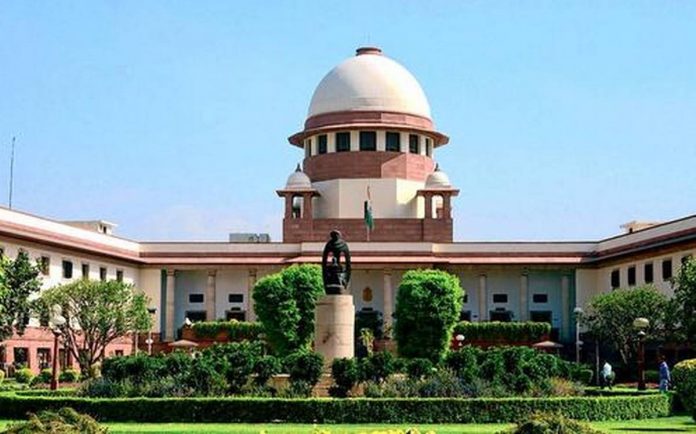The Supreme Court five-judge Constitution Bench has reserved its judgment in petitions challenging the Maharashtra Socially and Educationally Backward Classes Act 2018 (SEBC Act). (Jaishri Laxmanrao Patil Vs The Chief Minister & Ors.)
The Apex Court after an extensive 10 days hearing in numerous pleas filed against Bombay High Court order upholding the Maharashtra SEBC act whereby an extended 16 percent reservations for Marathas in jobs and education under SEBC was reserved beyond the ceiling limit of 50% reservation in extraordinary circumstances justified by quantifiable data.
The Supreme Court five-judge constitution bench led by Justice Ashok Bhushan and Justices L. Nageswara Rao, S. Abdul Nazeer, Hemant Gupta and S. Ravindra Bhat has reserved the judgment on the issue of whether the top court’s verdict in Indra Sawhney of capping reservation at 50 per cent needs re-examination.
The matter was referred by a 3 Judges bench to determine the issue whether the State Government has the Power to declare a class as Socially and Economically Backward after 102nd amendment in the Constitution of India.
AG KK Venugopal, SG Tushar Mehta, Sr. Adv. BH Marlappalle, Sr. Adv. Mukul Rohatgi, Sr. Adv. Kapil Sibal, Sr. Adv. Paramjit Patwalia, Sr. Adv. Shekhar Naphade, Sr. Adv. Jaideep Gupta, Sr. Adv. Chander Uday Singh, Sr. Adv. Mahalakshmi Pavani, Sr. Adv. Siddharth Bhatnagar,Sr. Adv. AM Singhvi, Sr. Adv. Arvind Datar, Sr. Adv.Rajeev Dhavan, Sr. Adv. Shyam Divan, Sr. Adv. V. Shekhar are amongst the counsels who appeared for different parties.
Highlights during the 10 Days Hearing in Supreme Court of India
• Sr. Adv. Shekhar Naphade submitted that Indra Sawhney judgment had to be reconsidered. “It is extremely difficult to cull out the ratio in the 1992 and judgments passed after it.”
• Sr. Adv. Mukul Rohatgi submitted that 50 percent should not be the limit.
• Sr. Adv. Kapil Sibal “What is prohibited is hostile discrimination and not reasonable classification which is struck down in Article 15(1), reflected in NM Thomas itself.”
• Sr. Adv. Jaideep Gupta submitted that the Judgment in Indra Sawhney requires a re-look as much water had flown under the bridge since 1991. If there is a conflict, there is a huge price to pay. “In a federal structure, with different regimes in the Centre and State, this will become an issue of greater political conflict.”
• Sr. Adv. C U Singh submitted, “Being politically powerful does not mean that the community cannot be socially and educationally backward. Yadavs in Bihar may be politically powerful but they are still OBCs. One has nothing to do with the other.”
• Sr. Adv. Paramjit Patwalia submitted with respect to Gaikwad commission report and stated that it was an advisory report subjected to be reviewed after 10 years. “This report being in the nature of an advice is not the subject matter of judicial scrutiny like the Court would scrutinize a judgment. The purport of the report has to be kept in mind.”
• SG Tushar Mehta submitted that in Centre’s view, The Maharashtra SEBC act is Constitutional.
• The Bench, “Reservations may go, only Economically Weaker Section (EWS) may remain, but these are policy matters for Govt to decide.”
• Attorney General KK Venugopal submitted that 102nd Amendment could not be unconstitutional. “There is an express provision in the Constitution dealing with ‘backward classes’ so far as backward classes are concerned. If it is traceable to Article 16(4), it cannot be a subject matter of ‘State Public Services’.”
On June 27, 2019, the Bombay High Court had upheld the constitutional validity of the Act. It reasoned that:
• State governments have the power to increase reservation beyond the ceiling limit of 50% in extraordinary circumstances justified by quantifiable data.
• The Justice Gaikwad Commission report was based on scientific and quantifiable data which adequately justified both including Marathas as a socially and educationally backward class as well as the extra-ordinary condition of creating reservations beyond the 50% ceiling limit.
• The State Government did not encroach upon judicial power as it did not directly overrule any court order. It merely removed the basis of the Court’s earlier order by repealing the 2014 Ordinance and Act.
• The Act meets the test of reasonable classification under Article 14 of the Constitution as it provides reservation for the newly identified class of Marathas, who have been historically incorrectly denied affirmative action, without unjustly depriving the existing Other Backward Classes.
• The 102nd Constitution (Amendment) Act, 2018 does not curtail the legislative competency of state legislatures to give effect to Articles 15(4) and 16(4) of the Constitution through a fair and adequately effective Commission.
The State of Maharashtra had passed the SEBC Act, 2018 to provide 16 percent reservation for the Maratha community in jobs and educational institutions. The Act was challenged before the Bombay High Court which had upheld its constitutional validity. The decision of the Bombay High Court upholding the law with modifications was challenged in the Supreme Court. One of the primary grounds for challenge was that this law, if implemented, would breach the 50% ceiling for reservations.
Read Also: Tatas win, Supreme Court allows appeals against NCLAT order reinstating Cyrus Mistry
During the 10 days hearing counsels for different states appeared to submit their arguments on the matter along with other counsels appearing for petitioners who were benefited from the impugned legislation, and different organizations.
Read the Order
Jaishri-Laxmanrao-Patil-Vs-Chief-Minister

